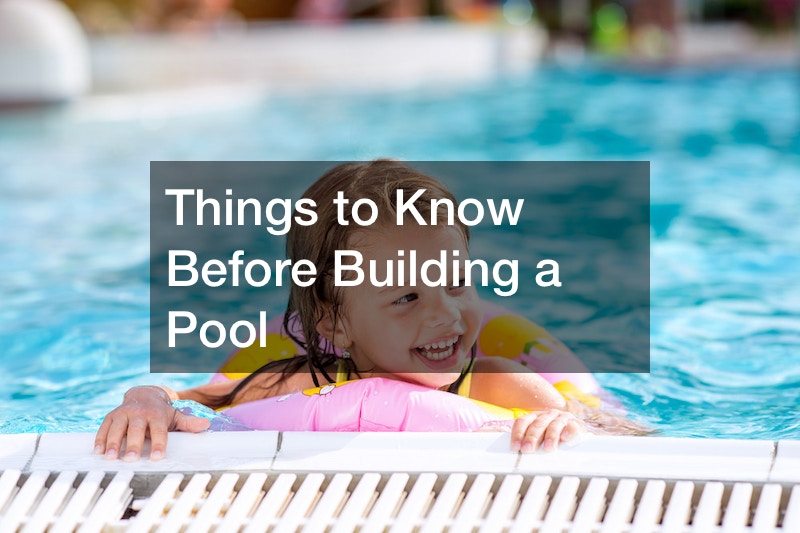
A pool is a prime investment, and its installation or construction can be costly. If you are considering building a pool, you want to plan accordingly to ensure it’s successful. There are various things to know before building a pool, as you shall learn in this article. The initial step to building a pool is to decide the size and type of pool that meets your budget. A practical budget helps you make informed decisions regarding pool features, materials, and size. It’s important to establish whether your yard is ideal for a pool. Certain features, such as a weirdly shaped space or steep slopes, can make the pool construction process difficult and costly. Here are considerations to make before building a pool.
Yard Condition

Apart from ascertaining the right pool size for your yard’s dimensions, determine the area’s accessibility, soil type, and slope. Pools are easy to install or build on a level yard. If your yard is not level or if there are shrubs and trees in your yard, you may need to hire tree removal services o clear the land. As technology advances, homeowners can now construct or install a pool in a wide range of yards. Severe yard conditions like limited access, rocky soil, and steep sloping lots require specialized installation and construction considerations. These factors can impact the overall duration and cost of the pool construction project.
Know the Right Pool for Your Needs
Before outlining your pool design, you need to determine the available types. Do you want an infinity edge pool, a waist-deep pool, or a cocktail pool? The shape and depth of your pool are critical things to know before building a pool. Before installing or building a pool, determine the amount of space available in your backyard. Further, know the purpose of your pool. The best way to know these factors is by visualizing people resting, getting entertained, or swimming in the pool. Outline how you plan to use the pool and who will use it. You may want to use the pool for family fun, games, or long hours of relaxation. If you are a fitness enthusiast, you may need to use your pool for fitness and health purposes. Whatever your reasons for wanting the pool are, you want to ensure it’s the right size and practical.
Safety
Safety is a vital factor to consider before building a pool. You will need to use non-slip materials around the pool’s parameter to reduce the risk of accidents. There are various pre-cast non-slip concrete pavers available in the market. You can also use good exterior wood options such as Ipe wood and the right sealant. Exterior wood is aesthetically pleasing for wood decking enthusiasts. Fencing is among the crucial things to know before building a pool. There are different ways of using fences in the pool to keep toddlers and pets away. Some of the common options include hedging in combination with deer fencing. You can source these from your local store. Some homeowners may opt for a formal iron gate. Regardless of your choice, you need to hire a fence contractor to inspect the area and lead the installation process. Professionals have the expertise and tools to make the fence installation successful.
The Pool’s Shape
To determine your preferred pool shape, consider the aesthetic of your backyard. Remember, some pool shapes complement the surrounding structures or landscapes better than others. For example, suppose your backyard is modern with rectangular and square landscaping structures and paths; a square pool may be the best option. Suppose the backyard has an organic and circular shape; a curved-edged pool would be ideal. Determine the ideal location for the pool. For example, if you build it near the home, establish the best area based on its silhouette. You can opt to build it further in your backyard, where you can experiment with its shape better. Common pool shapes include oval, circular, Grecian, geometric, rectangular L-shaped, and free-form. You can incorporate these shapes into different backyard styles like tropical, Mediterranean, traditional, or modern. An infinity-vanishing-edge option will be ideal if you prefer a fancy pool.
Above-ground or In-Ground Pool
There are two pool membrane options. Above-ground and in-ground. While in-ground pools are popular in backyards and residential properties, building them can be costly. The above-ground pool may be ideal if you are working on a budget. Still, in-ground pools blend seamlessly with the surroundings and property. Diving in and getting out of an in-ground pool is also easy. Above-ground pools are not as aesthetically appealing as their in-ground counterparts. Further, they are not durable. As a result, if you want a pool that will last longer and boost the return on investment, choose an in-ground pool. The long-term benefits surpass the high initial investment.
Determine the Best Materials for Your Preferred Pool

Four types of pool building materials can be used for in-ground pools. Pool building materials are things to know before building a pool. Concrete is a popular pool construction material. One of the most effective things about a concrete-based pool they offer a wide range of options in terms of design. You can build any of your dream pools using concrete. The process of building a concrete pool is similar to constructing a house. Before constructing concrete block walls, you will need to excavate and build a foundation. Install lining regardless of the material you are using. These tasks can be complex and are better executed by professionals. Remember, pool construction is a delicate process, and a small mistake may result in leaking. While concrete pools can be durable, building them takes longer. It can take a few weeks or even months from start to completion.
Vinyl Liner
Vinyl liner pools are made with polypropylene plates supported by outer ribbing. These pools are nearly ready-made, meaning you can start using them immediately. Various sizes and shapes are available. However, you can’t custom-build them, as with concrete pools. One of the core things to know before building a pool is that vinyl liner options are only available in the color blue. Again, you must use concrete to safeguard the decks and walls. While vinyl liner pools are the most cost-friendly, the options are limited. Further, they are smaller and lack aesthetic appeal.
Laminate and Fiberglass
Also referred to as composite pools, fiberglass pools are a combination of solid and elastic materials. They are constructed on-site in layers. The layers can be installed, laid, or painted while the pool remains inside. The pool shells are pre-made, limiting the shape options. You’ll need bricks for the pool’s foundation but not the side walls. Laminate and fiberglass pools are cost-friendly options that are easy to install.
Ceramic
Ceramic pools are modern designs, and some of the things to know before building a pool. These pool options are commonly found in Europe and Australia. The technology incorporates a carbon filter and ceramic layer into a fiberglass or composite design. This procedure eases foundation repair making the structure damage and leak resistance more durable. Ceramic pool designs are some of the most aesthetically appealing, with the top layer featuring glitter and color. The pool water in ceramic walls often seems to be sparkling. Ceramic materials are smooth, making them bacteria and dirt-resistant. The professional installer should ensure the floor is slightly rough to prevent slipping when installing a ceramic pool. The installation process is easy and fast. The pool is usually ready within one or two weeks.
Understand how to Choose a Contractor
A reliable contractor can ease the process of building a pool. However, finding a good contractor can be a difficult task. Consider getting referrals from neighbors and friends to make the search process more manageable. Don’t pick the first contractor that comes your way. Instead, interview up to three pool builders before choosing one that best meets your needs. When it comes to picking a contractor, there are various things you should know before building a pool. First, establish how long they’ve been in business using their current ownership or name.
Make sure they are insured and bonded and get proof of the same. Request them for referrals and strive to evaluate their work individually. Ask their previous clients to share their genuine experiences with the contractor. Doing so helps you make an informed decision. You can also ask suppliers about a contractor’s status. Find out whether they work with their staff or subcontract work. Do they offer multiple design services or specialize in a particular design? Remember, you shouldn’t pay the total amount for your project upfront. Always be wary of contractors who ask for the total amount beforehand and obtain lien waivers for completed works.
The Pool Building Timeline

One of the things to know before building a pool is that there will be lots of dirt around your yard and the compound in general. What with the tree trimming and excavation works? At some point, you will need a paving service provider to construct and finish the outdoor pool area neatly. Your contractor should estimate the project timeline and give you an expected completion date. Remember, some factors can hinder your plans and expectations. As a result, you need to be prepared for unforeseen circumstances. Building an in-ground pool can take three weeks to three months, based on how complex the project is. Your contractor can install an above-ground pool in a few days or even hours.
Pool Insurance Coverage
Insurance coverage for pools is included in homeowner’s insurance. While some insurance firms increase premiums for pool owners, others don’t. Talk to your insurance agent before building a pool. What do you need to know before building a pool regarding insurance coverage? Homeowner’s insurance may cover pool-related injuries. However, this depends on how the injury occurred, the safety features in place, and residential swimming pool laws within your local area. Suppose someone uses the pool without authorization and suffers injuries; you may not be liable. However, you can be held liable if you invite them and they suffer injuries. Many property insurers ask homeowners to install safety features to limit pool-related accidents and injuries. Apart from fencing the entire pool, homeowners can also install custom doors in key entry points to limit access to authorized persons. Choosing the right liability coverage level is crucial to safeguarding your financial welfare.
Determine the Cost of Building a Pool

The entire cost of building a pool depends on various factors, such as the type, design, and size. Cost is one of the core things to know before building a pool. Above-ground pools are more cost-friendly than in-ground pools. A large above-ground pool that doesn’t need filtration equipment can cost approximately $1,000. If you want a more elaborate and larger above-ground pool complete with filtration equipment, you will pay between $1,000 and $8,000. Additional features like patio shade covers and landscaping can increase the cost. The building and design cost of an in-ground pool can be high. In-ground pools with basic fencing and the least patio surrounding can cost approximately $20,000. Elaborate designs cost from $50,000 to $100,000. The pool design, patio materials, building materials, lighting, landscaping, and extra accessories you choose determine the final cost.
Ongoing Pool Costs
The expenses affiliated with pools continue past the construction phase. It’s important to understand the ongoing costs before constructing a pool. For example, swimming pool chemicals costs from $50 to $100 monthly. This cost depends on the frequency of use, pool size, and climate. If you plan to hire a professional to operate and maintain the pool, the cost will be between $100 and $350. Pool cover storage and pool cleaning attract additional costs. Equipment lifecycle varies based on brand and quality. Other factors like the equipment location and water chemistry can affect their life expectancy. Utility bills often rise based on the pool’s frequency of use due to the electricity required to facilitate the pumping process. If you have a heated pool, you will pay higher energy bills.
Building a pool can be a complex process. However, understanding the things to know before building a pool makes the process easier. Collaborating with a professional is crucial for the success of the project.


